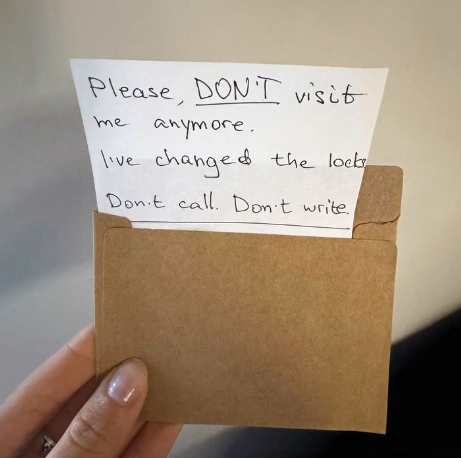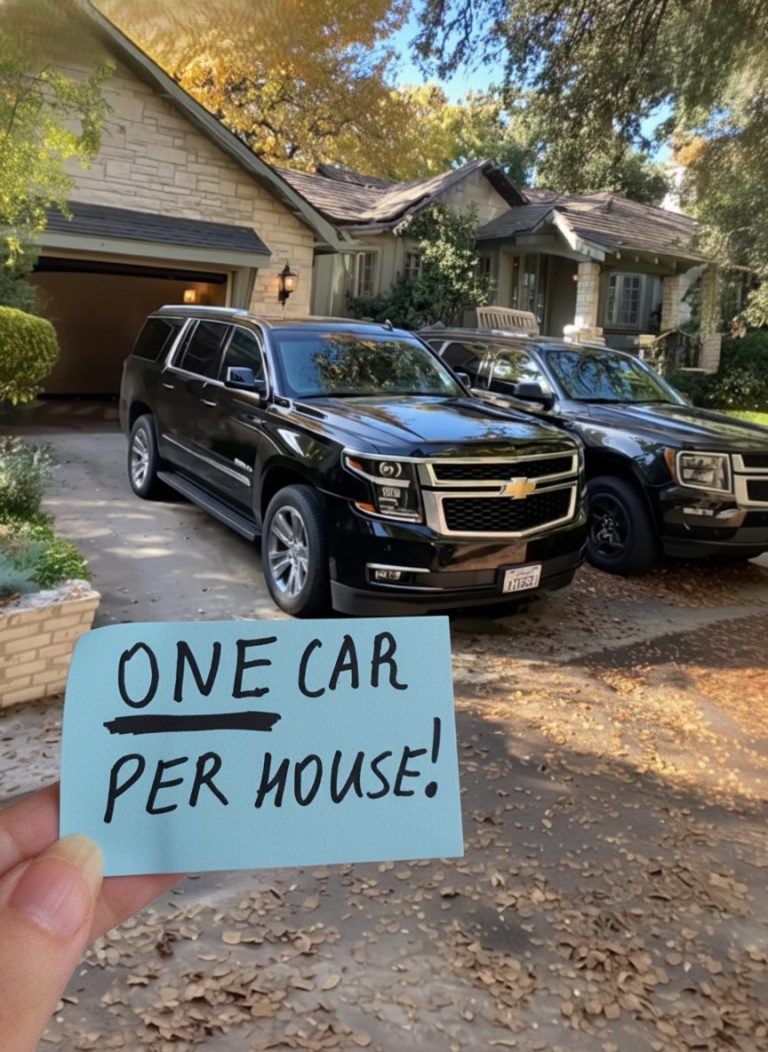
Last week, I got a letter from my grandma telling me never to visit her again.
It hit me like a ton of bricks because my grandma raised me and my sisters after our mom died when I was 11.
At first, I thought it was a joke. I called my sisters—turns out, they got the same letter.
Grandma’s health had been declining, but we still visited weekly. None of this made sense. She was always loving. Always kind.
So, I drove to her house.
When I got there, my stomach dropped—the locks had indeed been changed.
I knocked. No answer.
Something felt wrong.
So I decided to stay and watch from around the corner.
Half an hour later, my heart dropped as a young woman approached the door, opened the lock, and entered like she owned the place.
All pale and panicking, I rushed forward.
I had to find out what was going on with my granny.
I sprinted across the lawn and knocked again—louder this time.
No answer.
So I banged on the door. “HELLO? I know someone’s in there!”
The young woman finally opened the door, only a crack. Her expression was cold, guarded.
“Can I help you?” she asked.
“I’m her granddaughter,” I said, pushing the door open farther. “Where’s my grandma?”
She didn’t move. “She doesn’t want visitors.”
“She raised me,” I snapped. “She sent me a letter out of nowhere telling me never to come back. That’s not her. What’s going on here?”
The woman looked me up and down. “She’s resting. You need to go.”
My gut screamed that something was horribly wrong.
So I took a gamble. “Then call her to the door. Let me see her with my own eyes—or I’m calling the police.”
That got her attention.
She hesitated, then slowly stepped back. “Fine. Wait here.”
I stood in the living room I knew like the back of my hand—except now, everything felt…off.
Furniture was rearranged. Family photos gone. The cozy afghan my grandma always draped over the couch was folded up and shoved in a corner. It didn’t feel like her home anymore.
A few moments later, I heard slow, uneven footsteps.
And then—there she was.
My grandma, looking frailer than I’d ever seen her, eyes dull, wearing a robe that wasn’t hers. She blinked at me in confusion.
“Grandma?” I whispered.
She took a shaky breath. “Why… why are you here?”
Tears welled in my eyes. “You told me never to come back. That’s not you. Please, tell me what’s going on.”
Her lips quivered. She looked over her shoulder… then down at the floor. And in a barely audible voice, she said:
“I didn’t write those letters.”
My breath caught.
“You didn’t write them?” I asked, stepping closer. “Then who did?”
Grandma looked over her shoulder again. The young woman was nowhere in sight—but the way Grandma’s hand trembled told me she was still nearby.
“I’m not supposed to talk about it,” Grandma whispered, barely moving her lips. “She said… they’d take me away.”
“Who, Grandma? Take you where?”
Her voice was shaking now. “I don’t know. She came about a month ago. Said she was from a senior care outreach program. Started helping around the house. Cooking, organizing… I was grateful, at first.”
She took a breath. “Then things started disappearing. My phone. My hearing aids. The mail. One day I woke up and the locks were changed.”
Rage started boiling in my chest. “You’ve been isolated.”
“She won’t let me call anyone. Said I was too confused to handle visitors. And then… the letters. She made me sign things. I didn’t understand it all, but—” Grandma’s eyes filled with tears. “She said if I didn’t cooperate, she’d put me in a home. Said no one would believe me anyway.”
I grabbed her hands. “I believe you. And I’m not leaving without you.”
That’s when the young woman reappeared in the doorway.
“Alright,” she said, her voice sugary-sweet but her eyes steely. “That’s enough visiting for today.”
I straightened. “Actually, it’s not. I know exactly what’s happening here, and you’re not going to get away with it.”
Her smile faltered.
I pulled out my phone and hit record.
“You’re manipulating a vulnerable senior, forging letters, and isolating her from her family. That’s elder abuse. And I’ve got everything I need to press charges.”
She turned white.
“Leave. Now,” I said, stepping between her and my grandma.
She backed away, muttering something under her breath—but she left.
And I locked the door behind her.
After I locked the door, I called my sisters. They were already halfway to Grandma’s house. I told them everything—the letters, the woman, the threats.
They didn’t even hesitate.
“We’re calling the police,” my oldest sister said. “And Adult Protective Services. Right now.”
Within the hour, two officers and a caseworker were standing in Grandma’s living room. Grandma sat between my sisters and me on the couch, gripping our hands like lifelines.
The officers asked gentle but thorough questions. The caseworker examined documents, checked the medicine cabinet, reviewed any cameras or tech in the home.
When the officer opened the drawer by the front door, he found a plastic bag full of unmailed letters—all addressed to us. Letters Grandma had written, begging us to visit. Asking why we hadn’t come.
That’s when the caseworker’s expression turned cold.
“She intercepted your mail,” she said. “This is a clear case of elder isolation and financial manipulation. You did the right thing coming here.”
Grandma started to cry—but this time it wasn’t out of fear. It was relief.
The young woman was tracked down that same night. Turned out she wasn’t from any outreach program. She had a string of aliases and was under investigation in another state for similar schemes.
The locks were changed again—this time by us.
And Grandma?
We moved her into my sister’s guest suite for the time being. We take turns staying with her, making her tea, playing her favorite music, and reminding her every day that she’s safe now.
Later, when things calmed down, Grandma said something I’ll never forget.
“I thought I’d be forgotten in this world,” she whispered. “But I see now… love remembers.”
And she was right.



